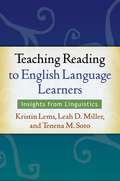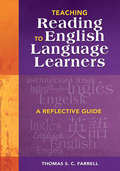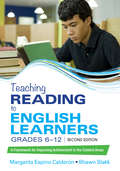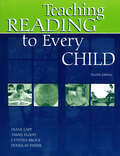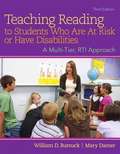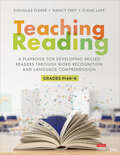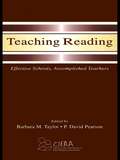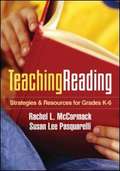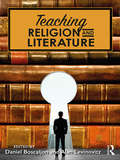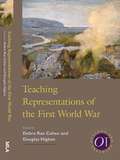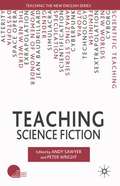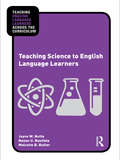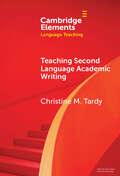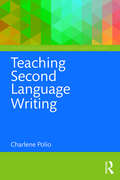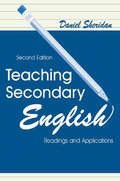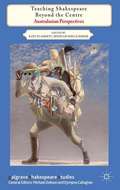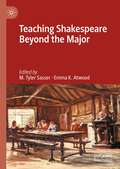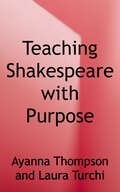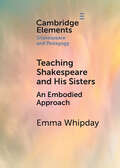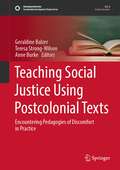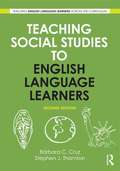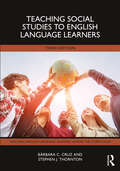- Table View
- List View
Teaching Reading to English Language Learners
by Leah Miller Kristin LemsWritten specifically for K 12 educators, this accessible book explains the processes involved in second-language acquisition and provides a wealth of practical strategies for helping English language learners (ELLs) succeed at reading. The authors integrate knowledge from two fields that often remain disconnected linguistics and literacy with a focus on what works in the classroom. Teachers learn effective practices for supporting students as they build core competencies not just for reading in English, but also for listening, speaking, and writing. Engaging vignettes and examples illustrate ways to promote ELLs' communicative skills across the content areas and in formal and informal settings.
Teaching Reading to English Language Learners: A Reflective Guide
by Thomas S. FarrellThis resource offers practical methods for helping ELLs succeed in reading, with strategies to increase fluency and comprehension, teach vocabulary and text structure, and more.
Teaching Reading to English Learners, Grades 6 - 12: A Framework for Improving Achievement in the Content Areas
by Margarita Espino Calderon Shawn M. Sinclair-SlakkRetool your whole school for EL achievement For any student, middle and high school can be challenging. But for an English learner or striving reader—and the myriad words, phrases, syntax, texts, and concepts they must negotiate on a daily basis—the stakes seem a whole lot higher. Fortunately for content-area teachers, Margarita Calderón and Shawn Slakk make available in a single resource all the best instructional and professional development combinations for expediting comprehension across the secondary grades. Really a tool to assist all learners across all language needs, the second edition of Teaching Reading to English Learners, Grades 6-12, provides evidence-based strategies for helping content-area teachers and schools at large: Teach academic language in all subject areas Embed discourse practice through interaction strategies Integrate basic and close reading comprehension skills into lessons Teach drafting, revising, and editing for content-specific writing Use cooperative learning to develop social emotional skills and enhance academic achievement Calderón and Slakk know firsthand that if we’re to counter the commonly held narrative of predictable failure among our ELs, it takes a whole school, and they have the evidence to prove it. Read Teaching Reading to English Learners, Grades 6-12, implement its strategies across all classrooms, and soon enough you, too, will maximize the comprehensions skills so critical to our ELs’ long-term success.
Teaching Reading to English Learners, Grades 6 - 12: A Framework for Improving Achievement in the Content Areas
by Margarita Espino Calderon Shawn M. Sinclair-SlakkRetool your whole school for EL achievement For any student, middle and high school can be challenging. But for an English learner or striving reader—and the myriad words, phrases, syntax, texts, and concepts they must negotiate on a daily basis—the stakes seem a whole lot higher. Fortunately for content-area teachers, Margarita Calderón and Shawn Slakk make available in a single resource all the best instructional and professional development combinations for expediting comprehension across the secondary grades. Really a tool to assist all learners across all language needs, the second edition of Teaching Reading to English Learners, Grades 6-12, provides evidence-based strategies for helping content-area teachers and schools at large: Teach academic language in all subject areas Embed discourse practice through interaction strategies Integrate basic and close reading comprehension skills into lessons Teach drafting, revising, and editing for content-specific writing Use cooperative learning to develop social emotional skills and enhance academic achievement Calderón and Slakk know firsthand that if we’re to counter the commonly held narrative of predictable failure among our ELs, it takes a whole school, and they have the evidence to prove it. Read Teaching Reading to English Learners, Grades 6-12, implement its strategies across all classrooms, and soon enough you, too, will maximize the comprehensions skills so critical to our ELs’ long-term success.
Teaching Reading to Every Child
by Douglas Fisher James Flood Diane Lapp Cynthia H. BrockThis popular text, now in its Fourth Edition, introduces pre-service and in-service teachers to the most current theories and methods for teaching literacy to children in elementary schools. The methods presented are based on scientific findings that have been tested in many classrooms. A wealth of examples, hands-on activities, and classroom vignettes--including lesson plans, assessments, lists of children's literature books to fiction and nonfiction texts, and more--illustrate the methods and bring them to life.The text highlights the importance of teaching EVERY child to become competent in all of the nuances and complexities of reading, writing, and speaking.The value of reflection and peer discussion in learning to expand their students' literacies is emphasized. Readers are encouraged to reflect on their own experiences with reading and teaching throughout their lifetimes--experiences that will serve well in learning to teach reading. "Your Turn" boxes invite readers to think about their views of the material presented, and to talk with colleagues and teachers about their "best ways" of learning this new information. "Did You Notice?" boxes engage readers in observation and analysis of methods and classroom situations discussed in the text. Teachers' stories serve as models of successful teaching and to draw readers into professional dialogue about the ideas and questions raised. End-of-chapter questions and activities provide additional opportunities for reflection and discussion. All of these pedagogical features help readers expand and refine their knowledge in the most positive ways.Topics covered in Teaching Reading to Every Child, Fourth Edition:*Getting to Know Your Students as Literacy Learners;*Looking Inside Classrooms: Organizing Instruction;*Assessing Reading Achievement;*The Importance of Oral Language in Developing Literacy;*Word Identification Strategies: Pathways to Comprehension;*Vocabulary Development;*Comprehension Instruction: Strategies At Work;*Content Area Learning;*What the Teacher Needs to Know to Enable Students' Text Comprehension;*Writing: Teaching Students to Encode and Compose;*Discovering the World Through Literature;*Technology and Media in Reading;*Teaching Reading to Students Who Are Learning English;*All Students are Special: Some Need Supplemental Supports and Services to Be Successful; and*Historical Perspectives on Reading and Reading Instruction.New in the Fourth Edition:*A new chapter on technology with state-of-the-art applications;*A new chapter with the most up-to-date information on how vocabulary is learned and on how it is best taught, responding to the national renewed interest in vocabulary instruction;*A new section on Readers/Writer's workshop with a focus on supporting student inquiry and exploration of multiple genres;*A more comprehensive chapter on literature instruction and the role of literature in the reading program with examples that support students' multigenre responses;*A discussion of literary theories with examples for classroom implementation;*Broader coverage of the phases of reading development from the pre-alphabetic stage to the full alphabetic stage;*A more inclusive chapter on writing instruction; and*A thoroughly revised chapter on teaching reading to students who are learning English, including extensive information on assessment and evaluation.
Teaching Reading to Students Who Are At Risk or Have Disabilities: A Multi-Tier, RTI Approach
by William D. Bursuck Mary DarnerAt a time when public focus on children who struggle with learning to read has never been greater, Bursuck and Damer''s Teaching Reading to Students Who Are at Risk or Have Disabilities, 3/e does an extraordinary job of answering the charge to help all students succeed at reading. Now in a newly updated Third Edition, this text describes, in a clear, step-by-step fashion, how to implement a systematic, explicit, success-oriented approach for teaching struggling readers in today''s accountability-driven schools. When recently evaluated in terms of relating to the Common Core Standards in Early Reading, this book was described as one of the few textbooks "comprehensively and rigorously covering the scientific basis and instructional elements of the five essential components of effective reading instruction. Integrated throughout are authentic, research-validated, reality-based strategies, accessible language and video demonstrations, and checks for student understanding.
Teaching Reading: A Playbook for Developing Skilled Readers Through Word Recognition and Language Comprehension (Corwin Literacy)
by Douglas Fisher Nancy Frey Diane K. LappThe comprehensive guide you can trust for evidence-based reading practices It′s settled science: developing skilled readers can enhance students’ lives. That’s why renowned educators Douglas Fisher, Nancy Frey, and Diane Lapp wrote this resource with the urgency of a code blue in an ER—because too many children, for many reasons, struggle with learning to become strong readers. Designed to be a one-stop shop for best practices, Teaching Reading is concise, encyclopedic, and essential. Thirteen interactive modules provide easy to read ideas to support you teaching every child to read very well. You will learn how to: Focus on two critical aspects of reading—word recognition and language comprehension. Select the best activities to support students in grades K-6 to learn letters and sound relationships. Provide developing readers with the most effective oral, written, and reading experiences. Recharge your confidence and craft with uplifting new research findings from neuroscience, cognitive science, and child development. Clear up confusions about phonics progressions, reading fluency, morphology, text selection, grammar, and more. Develop background knowledge, vocabulary, and comprehension instruction. Be up to date on how to help students attain deeper levels of comprehension by applying Theory of Mind and other cutting-edge ideas. Reading is a thrilling but complex process. It involves a heady mix of skills, schema, self-concept, and social dimensions. To give all students the chance to reap its rewards, we need a go-big kind of resource. This is it.
Teaching Reading: A Playbook for Developing Skilled Readers Through Word Recognition and Language Comprehension (Corwin Literacy)
by Douglas Fisher Nancy Frey Diane K. LappThe comprehensive guide you can trust for evidence-based reading practices It′s settled science: developing skilled readers can enhance students’ lives. That’s why renowned educators Douglas Fisher, Nancy Frey, and Diane Lapp wrote this resource with the urgency of a code blue in an ER—because too many children, for many reasons, struggle with learning to become strong readers. Designed to be a one-stop shop for best practices, Teaching Reading is concise, encyclopedic, and essential. Thirteen interactive modules provide easy to read ideas to support you teaching every child to read very well. You will learn how to: Focus on two critical aspects of reading—word recognition and language comprehension. Select the best activities to support students in grades K-6 to learn letters and sound relationships. Provide developing readers with the most effective oral, written, and reading experiences. Recharge your confidence and craft with uplifting new research findings from neuroscience, cognitive science, and child development. Clear up confusions about phonics progressions, reading fluency, morphology, text selection, grammar, and more. Develop background knowledge, vocabulary, and comprehension instruction. Be up to date on how to help students attain deeper levels of comprehension by applying Theory of Mind and other cutting-edge ideas. Reading is a thrilling but complex process. It involves a heady mix of skills, schema, self-concept, and social dimensions. To give all students the chance to reap its rewards, we need a go-big kind of resource. This is it.
Teaching Reading: Effective Schools, Accomplished Teachers
by P. David Pearson Barbara M. TaylorThis unique book tells the story of a select group of schools and teachers who have managed to beat the odds in terms of improving elementary students reading achievement. Originating with the CIERA School Change Project directed by Barbara Taylor and David Pearson, it was subsequently expanded to include the work of other research teams doing similar work. It combines large scale studies of effective schools and teachers (Part I) with case studies of individual schools and teachers who have successfully transformed research findings into situation-specific strategies appropriate to their schools and classrooms (Parts II and III). The book's distinct contribution is showing that no matter how consistent the research findings on effective school and classroom practice, groups of teachers must improvise their own situation-specific programs and practices. In short, they must be able to create variations on a common theme. Key features of this outstanding new volume include: *Integration of research and cases--One cannot fully understand research-based general principles without knowing how they play themselves out in specific settings. Similarly, one cannot fully understand cases without seeing the commonalities across different schools and classrooms sharing similar goals. This book provides both perspectives. *Diverse cases--The schools and classrooms depicted in this book are urban, rural, and suburban; poor and middle class; and English-only and bilingual. Rather than telling readers how to beat the odds, it provides them with a wide variety of cases from which they can extrapolate to build their own customized teaching programs and practices. *Summarizing section--The final section contains a summary of research on effective schools and teachers and a concluding chapter by Gerry Duffy and Jim Hoffman in which they reflect on the book's content and possible directions for future research. The book is targeted to both in-service elementary teachers and literacy students in advanced college courses.
Teaching Reading: Strategies and Resources for Grades K-6
by Rachel L Mccormack Susan Lee PasquarelliElementary teachers of reading have one essential goal—to prepare diverse children to be independent, strategic readers in real life. This innovative text helps preservice and inservice teachers achieve this goal by providing knowledge and research-based strategies for teaching phonemic awareness, phonics, fluency, vocabulary, all aspects of comprehension, and writing in response to literature. Special features include sample lessons and photographs of literacy-rich classrooms. Uniquely interactive, the text is complete with pencil-and-paper exercises and reproducibles that facilitate learning, making it ideal for course use. Readers are invited to respond to reflection questions, design lessons, and start constructing a professional teaching portfolio.
Teaching Religion and Literature
by Daniel Boscaljon Alan LevinovitzTeaching Religion and Literature provides a practical engagement with the pedagogical possibilities of teaching religion courses using literature, teaching literature classes using religion, and teaching Religion and Literature as a discipline. Featuring chapters written by award winning teachers from a variety of institutional settings, the book gives anyone interested in providing interdisciplinary education a set of questions, resources, and tools that will deepen a classroom’s engagement with the field. Chapters are grounded in specific texts and religious questions but are oriented toward engaging general pedagogical issues that allow each chapter to improve any instructor’s engagement with interdisciplinary education. The book offers resources to instructors new to teaching Religion and Literature and provides definitions of what the field means from senior scholars in the field. Featuring a wide range of religious traditions, genres, and approaches, the book also provides an innovative glimpse at emerging possibilities for the sub-discipline.
Teaching Representations of the First World War (Options for Teaching #41)
by Debra Rae Cohen Douglas HigbeeThe First World War saw staggering loss of life and was a catalyst for many political and social changes. It was also shaped by the media and art forms that expressed it: film, photography, poetry, memoir, posters, advertisements, and music. This volume's scope shows that today's instructors contend with many different issues in teaching the First World War in a variety of classroom settings. Among these issues are the war's relation to modernism; global reach in the Middle East and South Asia; influence on psychiatry, pacifism, and consumer culture; and effect on public health and the 1918 influenza pandemic.
Teaching Representations of the French Revolution (Options for Teaching #47)
by Julia Douthwaite Viglione, Antoinette Sol, and Catriona SethIn many ways the French Revolution--a series of revolutions, in fact, whose end has arguably not yet arrived--is modernity in action. Beginning in reform, it blossomed into wholesale attempts to remake society, uprooting the clergy and aristocracy, valorizing mass movements, and setting secular ideologies, including nationalism, in motion. Unusually manifold and complicated, the revolution affords many teaching opportunities and challenges. This volume helps instructors seeking to connect developments today--terrorism, propaganda, extremism--with the events that began in 1789, contextualizing for students a world that seems always unmoored and in crisis.The volume supports the teaching of the revolution's ongoing project across geographic areas (from Haiti, Latin America, and New Orleans to Spain, Germany, and Greece), governing ideologies (human rights, secularism, liberty), and literatures (from well-known to newly rediscovered texts). Interdisciplinary, intercultural, and insurgent, the volume has an energy that reflects its subject.
Teaching Science Fiction
by Peter Wright Andy SawyerTeaching Science Fiction is the first text in thirty years to explore the pedagogic potential of that most intellectually stimulating and provocative form of popular literature: science fiction. Innovative and academically lively, it offers valuable insights into how SF can be taught historically, culturally and practically at university level.
Teaching Science to English Language Learners
by Malcolm B. Butler Joyce Nutta Nazan U. BautistaBooks in the Teaching English Language Learners (ELLs) across the Curriculum Series are written specifically for pre- and in- service teachers who may not have been trained in ELL techniques, but still find themselves facing the realities and challenges of today's diverse classrooms and learners. Each book provides simple and straightforward advice on how to teach ELLs through a given subject area, and how to teach content to ELLs who are at different levels of English language proficiency than the rest of their class. Authored by both language and content area specialists, each volume arms readers with practical, teacher-friendly strategies, and subject-specific techniques. Teaching Science to English Language Learners offers science teachers and teacher educators a straightforward approach for engaging ELLs learning science, offering examples of easy ways to adapt existing lesson plans to be more inclusive. The practical, teacher-friendly strategies and techniques included here are proven effective with ELLs, and many are also effective with all students. The book provides context-specific strategies for the full range of the secondary sciences curriculum, including physical science, life science, earth and space science, science as inquiry, and history and nature of science and more. A fully annotated list of web and print resources completes the book, making this a one volume reference to help science teachers meet the challenges of including all learners in effective instruction. Special features: practical examples of science exercises make applying theory to practice simple when teaching science to ELLs an overview of the National Science Education Standards offers useful guidelines for effective instructional and assessment practices for ELLs in secondary grades graphs, tables, and illustrations provide additional access points to the text in clear, meaningful ways.
Teaching Second Language Academic Writing (Elements in Language Teaching)
by Christine M. TardyThis Element offers readers an overview of the theory, research, and practice of teaching academic writing to second language/multilingual (L2) students. The Element begins with a discussion of contextual features and some of the most common settings in which L2AW is taught. The Element then defines and shares examples of several concepts, pedagogical approaches, and teaching practices that are particularly relevant to L2AW instruction. Reflective questions guide readers to consider how these aspects of L2AW might be carried out within their own educational settings. Finally, the Element considers the rapid changes in technology and their influences on texts and academic writing.
Teaching Second Language Writing (The Routledge E-Modules on Contemporary Language Teaching)
by Charlene PolioThis module explores the purposes of and methods for teaching second language writing. Engaging and accessible, Teaching Second Language Writing is organized into three sections that mainly focus on activities, approaches and real-life writing tasks and genres that are the most applicable and useful for the language teaching classroom. -- The Routledge E-Book Modules on Contemporary Language Teaching introduce students to the major areas of second language instruction through jargon-free style and explain concepts as they are introduced thus facilitating comprehension for those with little or no background. The series consists of independent modules that can stand alone or be combined at the discretion of the reader or instructor. The modules can also be used as supplements to existing materials for maximum flexibility. Modules in this series include: Language (Bill VanPatten) Communication and Skill (Bill VanPatten) Second Language Acquisition: The Basics (Gregory D. Keating) Focusing on Form in Language Instruction (Wynne Wong and Daphnée Simard) Vocabulary in Language Teaching (Joe Barcroft) Interactive Tasks (Michael J. Leeser and Justin P. White) Technology in Language Learning: An Overview (Bryan Smith) Teaching Second Language Writing (Charlene Polio) Readers have the option to select and download electronically the 40-50 page modules for individual use, or to purchase multiple modules at once. With each module written by an expert in that respective field, with self-quizzes, reflection boxes, recommended readings, and discussion questions, these modules serve as the ideal text for introductory courses in Second Language Instruction. To purchase these modules and view module summaries, please visit the series companion website: www.routledgetextbooks.com/textbooks/9781315679594/
Teaching Secondary English: Readings and Applications
by Daniel SheridanThis new edition of Teaching Secondary English is thoroughly revised, but its purpose has not changed. Like the popular first edition, it balances content knowledge with methodology, theory with practice, and problem-posing with suggested solutions. The tone and format are inviting, while addressing student-readers on a professional level. Rather than attempting to cover everything, the text provides a framework and materials for teaching a secondary English methods course, while allowing considerable choice for the instructor. The focus is on teaching literature, writing, and language--the basics of the profession. Attention is given to the issues that arise as one seeks to explore what it means to "teach English." The problems and tensions of becoming a teacher are discussed frankly, in a manner that helps students figure out their own attitudes and solutions. Features: * Focuses on a few central concepts in the teaching of secondary English * Provides an anthology of 22 readable and challenging essays on key topics--allowing students to hear a variety of voices and opinions * Includes an applications section for each reading that extends the discussion and asks students to explore problems and grapple with important issues related to the articles * Offers short writing assignments in questions that follow the readings and in brief writing tasks in the applications, and a longer writing assignment at the end of each chapter * Addresses student readers directly without talking down to them New in the Second Edition: * This edition is shorter, tighter, and easier to use. * The opening and concluding chapters more directly address the concerns of new teachers. * The anthology is substantially updated (of the 22 articles included, 14 are new to this edition). * Each essay is preceded by a brief introduction and followed by questions for further thought. * There are fewer applications, but these are more extensive and more fully integrated within the text. * A writing assignment is provided at the end of each chapter. * Interviews with college students--before and after student teaching--are included in Chapters 1 and 6. * The bibliographies at the end of each chapter are fully updated.
Teaching Shakespeare Beyond the Centre
by Penny Gay Kate Flaherty L. E. SemlerShowcasing a wide array of recent, innovative and original research into Shakespeare and learning in Australasia and beyond, this volume argues the value of the 'local' and provides transferable and adaptable models of educational theory and practice.
Teaching Shakespeare Beyond the Major
by M. Tyler Sasser Emma K. AtwoodThis edited collection considers the task of teaching Shakespeare in general education college courses, a task which is often considered obligatory, perfunctory, and ancillary to a professor’s primary goals of research and upper-level teaching. The contributors apply a variety of pedagogical strategies for teaching general education students who are often freshmen or sophomores, non-majors, and/or non-traditional students. Offering instructors practical classroom approaches to Shakespeare’s language, performance, and critical theory, the essays in this collection explicitly address the unique pedagogical situations of today’s general education college classroom.
Teaching Shakespeare With Purpose: A Student-centred Approach
by Ayanna Thompson Laura TurchiWhat does it mean to teach Shakespeare with purpose? It means freeing teachers from the notion that teaching Shakespeare means teaching everything, or teaching "Western Civilisation" and universal themes. Instead, this invigorating new book equips teachers to enable student-centred discovery of these complex texts. Because Shakespeare's plays are excellent vehicles for many topics --history, socio-cultural norms and mores, vocabulary, rhetoric, literary tropes and terminology, performance history, performance strategies -- it is tempting to teach his plays as though they are good for teaching everything. <p><p>This lens-free approach, however, often centres the classroom on the teacher as the expert and renders Shakespeare's plays as fixed, determined, and dead. Teaching Shakespeare with Purpose shows teachers how to approach Shakespeare's works as vehicles for collaborative exploration, to develop intentional frames for discovery, and to release the texts from over-determined interpretations. In other words, this book presents how to teach Shakespeare's plays as living, breathing, and evolving texts.
Teaching Shakespeare and His Sisters: An Embodied Approach (Elements in Shakespeare and Pedagogy)
by Emma WhipdayWhat are we teaching, when we teach Shakespeare? Today, the Shakespeare classroom is often also a rehearsal room; we teach Shakespeare plays as both literary texts and cues for theatrical performance. This Element explores the possibilities of an 'embodied' pedagogical approach as a tool to inform literary analysis. The first section offers an overview of the embodied approach, and how it might be applied to Shakespeare plays in a playhouse context. The second applies this framework to the play-making, performance, and story-telling of early modern women – 'Shakespeare's sisters' – as a form of feminist historical recovery. The third suggests how an embodied pedagogy might be possible digitally, in relation to online teaching. In so doing, this Element makes the case for an embodied pedagogy for teaching Shakespeare.
Teaching Social Justice Using Postcolonial Texts: Encountering Pedagogies of Discomfort in Practice (Sustainable Development Goals Series)
by Teresa Strong-Wilson Geraldine Balzer Anne BurkeThis book explores how teachers can re-examine their emotional investments in enacting dominant settler values through changing their text selection and teaching practices. Based on a longitudinal qualitative research study conducted by a national team of literacy scholars in collaboration with practicing literacy teachers at eight sites across Canada, the book investigates how groups of teachers, working collaboratively in inquiry groups, develop and implement curriculum to promote their own and their students’ understandings of social justice in postcolonial and settler spaces. In particular, the book highlights the rich and dynamic landscape of postcolonial authors, illustrators and texts, the development of culturally- sensitive curricula, and critical pedagogies possible in addressing contemporary and historical issues, both local and global. This book is primarily of interest to literacy scholars, literacy instructors (teacher educators) in teacher education programs, educational leaders, practicing teachers from the K-12 spectrum, and school district staff and policy makers with responsibilities for or interests in the potential of literacy and literature engagement for social justice education. The book is also be of interest to postsecondary educators and teacher educators wishing to use literature in social justice, anti-racist, and anti-oppressive courses.
Teaching Social Studies to English Language Learners
by Stephen J. Thornton Bárbara C. CruzTeaching Social Studies to English Language Learners provides readers with a comprehensive understanding of both the challenges that face English language learners (ELLs) and ways in which educators might address them in the social studies classroom. The authors offer context-specific strategies for the full range of the social studies curriculum, including geography, U.S. history, world history, economics, and government. These practical instructional strategies will effectively engage learners and can be incorporated as a regular part of instruction in any classroom. An annotated list of web and print resources completes the volume, making this a valuable reference to help social studies teachers meet the challenges of including all learners in effective instruction. Features and updates to this new edition include: • An updated and streamlined Part 1 provides an essential overview of ELL theory in a social studies specific-context. • "Teaching Tips" offer helpful suggestions and ideas for creating and modifying lesson plans to be inclusive of ELLs. • Additional practical examples and new pedagogical elements in Part 3 include more visuals, suggestions for harnessing new technologies, discussion questions, and reflection points. • New material that takes into account the demands of the Common Core State Standards, as well as updates to the web and print resources in Part 4.
Teaching Social Studies to English Language Learners (Teaching English Language Learners across the Curriculum)
by Stephen J. Thornton Bárbara C. CruzThis fully updated new edition provides readers with a comprehensive understanding of the challenges that English language learners (ELLs), also known as English Learners (ELs), face, as well as the ways in which educators might address them in the social studies classroom.The authors offer context-specific strategies for the full range of the social studies curriculum, including geography, U.S. history, world history, economics, and government. These practical instructional strategies will effectively engage learners and can be incorporated as a regular part of instruction in any classroom. Features of this fully updated new edition include:· An updated and streamlined introduction, which provides an essential overview of ELL theory in a social studies-specific context;· "Teaching Tips" that offer helpful suggestions and ideas for creating and modifying lesson plans to be inclusive of English Learners;· Practical examples and pedagogical elements in Part 3, which include more visuals, suggestions for harnessing new technologies, discussion questions, and reflection points; and· Useful lists of online and print resources for teachers and students.Teaching Social Studies to English Language Learners is a valuable reference to help pre- and in-service social studies educators meet the challenges of including all learners in effective instruction.
